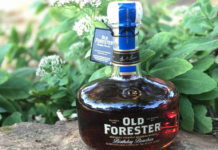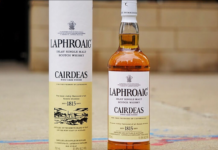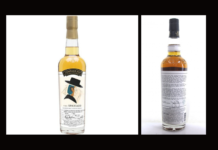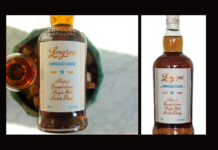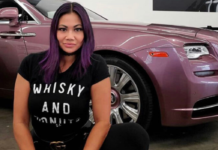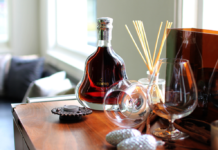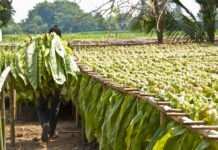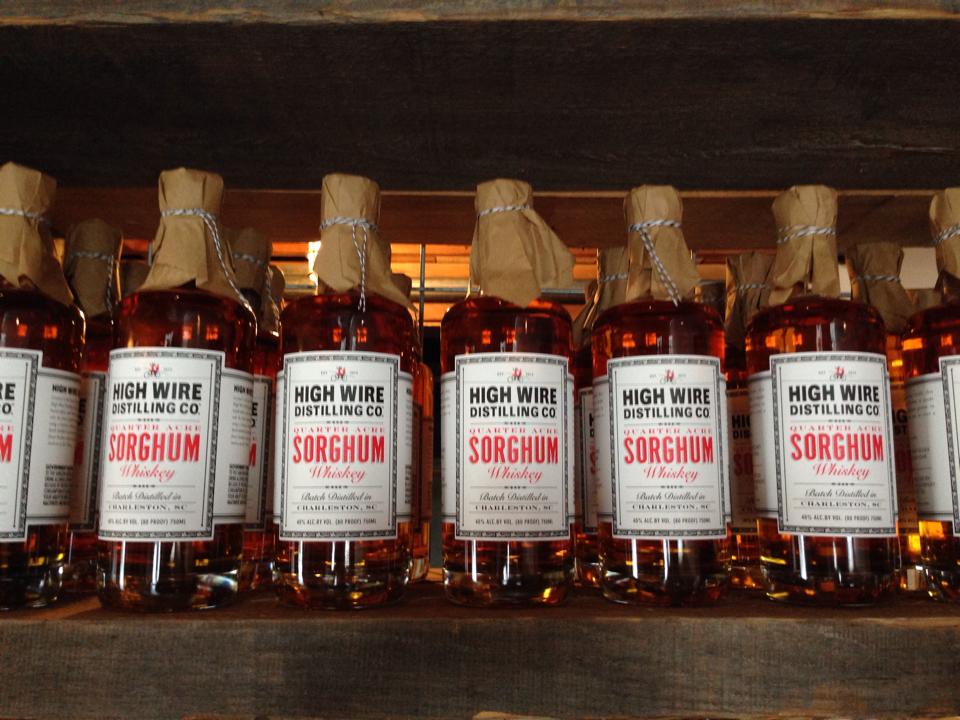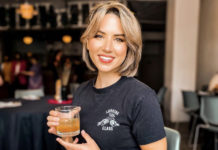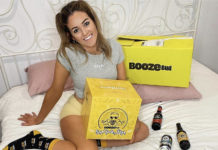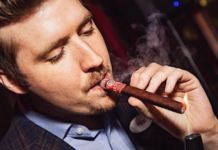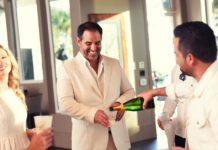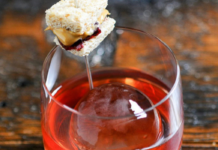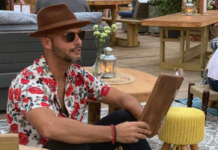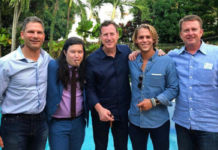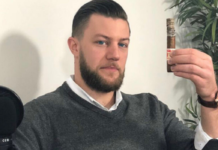Located in the heart of historic downtown Charleston, SC, High Wire Distilling Company is dedicated to making premium, handcrafted, small batch spirits. Our approach is simple: seek the finest ingredients available and develop recipes using a creative, culinary approach. All of our products are batch distilled in a hand-hammered, German copper still to create the finest Southern spirits available.
Founded by husband and wife team, Scott Blackwell and Ann Marshall, High Wire was born of a desire to introduce small batch, handmade, craft spirits to South Carolina. We spoke to Scott Blackwell, of the High Wire Distillery.
 Scott, tell us about yourself. How did you get into the world of spirit distillation?
Scott, tell us about yourself. How did you get into the world of spirit distillation?
SB: Well I’ve been in the food and beverage business pretty much my whole life. High Wire is my first alcohol related adventure. I started and owned a pie business in college, an ice cream distributorship, a restaurant, a coffee roasting company. My last company is called Immaculate Baking Co. My wife and I sold that company to General Mills about 4 years ago. We got into distilling at the suggestion of my wife. We were home brewing beer and I was really excited at the idea of opening a brewery, but my wife on the other hand wasn’t so excited by this. She thought the space was getting crowded and felt like we needed to explore other options. That exploration led us to Portland Oregon where we visited several distilleries including House Spirits owned and started by our friend Christian Krogstad. Christian agreed with my wife, and convinced us we on the right path.
So you were already an entrepreneur. What was your vision for High Wire Distilling. Tell us about the name.
SB: When we started thinking about brands and how we wanted to be perceived in this business we thought about what was going on pre-Prohibition? (Vaudeville, Traveling shows magicians, Circus?) something fun? something memorable? and something that was free in the trademark world! High Wire was all of that.
When High Wire Distilling began distilling were you aiming for a certain style of whiskey or liquor?
SB: To be honest we knew we generally wanted to make gins and whiskies and maybe rum. We had never made any liquor so we weren’t quite sure what we were getting into but again I have been in the food business and understood process and flavor(and the beer brewing helped too). We just knew whatever we made had to be unique, taste good and there had to be a need/want out there for it.
 What challenges did you face in the beginning of building the High Wire Distilling?
What challenges did you face in the beginning of building the High Wire Distilling?
SB: I’d have to say like any business its a quick uphill learning curve . There are the regulations, permitting the build out how to know what to buy and what not to, learning how to use all the equipment, sourcing all the materials all the record keeping! and oh yea! how to make actual spirits that tastes good! It’s pretty daunting!
What are some of your proudest moments in this business?
SB: I’d have to say I’ve had a few so far but two that stand out are when we figured out our gin formula. It was an early success and its cool to see it at so many bars and restaurants. The latest victory has to be our Jimmy Red Bourbon Whiskey. It was a major aha moment (but should be obvious) that the uniqueness and quality of an ingredient makes a big difference in the final products uniqueness and quality.
That victory has taken a while since we had to find the seed, grow the corn, make the whiskey, age it and finally release it just three years later…young in the whiskey world but an eternity when you go backwards before you go forwards! We released that first years whiskey last year and people went nuts it was an awesome feeling and very rewarding.
 What type of Whiskey do you currently produce?
What type of Whiskey do you currently produce?
SB: We produce a Rye made with 82% Wrens Abruzzi Rye, A 4 grain Bourbon made with white corn, barley, Soft wheat and Carolina Gold Rice. We also make the Jimmy Red Bourbon, a Sorghum Whiskey and have made two different Single Malts. All from heirloom grain, gmo free and mostly grown here in the southeast.
What is the most rewarding part of your job. Can you tell us what a typical day looks like for you?
SB: Making an educated guess and nailing the result you wanted. Like any small business, you have to wear a lot of hats and multitask all while trying to stay focused on the big picture. My days differ from one to the next. One day I might be focused on sales, next day I may be focused on an experiment we’re running and the following may be dealing with a busted pipe or researching/buying a new piece of equipment. Lately we’ve been diving deeper into process and trying to understand some of these basics that we may have been missing (or should I say refining our process)
Do you source the ingredients locally?
SB: Yes mostly and more and more.
How important is sourcing everything locally?
SB: Its important; more importantly it’s a unique great tasting ingredient- it’s great when that all matches up. Thankfully we have some great farms in the area that are willing to experiment and grow with us.
Does the geographic location and climate affect the maturation of the whiskey?
SB: Yes definitely just ask the Scotch guys about that! We are in a sub tropic ocean environment. We lose a lot of alcohol to angels share due to humidity and ocean air. Some days the distillery smells very nautical and gets over 110 degrees. We don’t have too many days where it freezes so the whiskey is constantly moving. I would add that our local grain also has different qualities as opposed to be grown somewhere else. Some of the fruit we work with has a briny quality about it due to salt in the soil.
 What in your opinion is the definition of the American Single Malt Whiskey?
What in your opinion is the definition of the American Single Malt Whiskey?
SB: I think it needs to have rules to keep us all on a level playing field. The rules on say bourbon are what make American spirits unique and what they are. Unlike say Canadian Whiskey where there’s a lack of rules we have only certain things we can do and use to make our whiskies(Canadian whiskey as you know can come from a blend of neutral spirits coloring a flavoring). The Canadian make some fine whiskies but the uphill battle they have at the moment is the lack of rules and definitions of what makes a whiskey a whiskey.
For other people looking to head into this industry, what challenges and learning experiences can you share with us?
SB: I’d say it’s not that hard to get into distilling and if you want to make say gin or vodka it’s not that hard to make- the hard part in that business is the distribution and costs associated with it. With that said the whiskey business has a few different hurdles one being that again it’s not hard to make whiskey however it is hard to make good whiskey and even harder to make better whiskey. To be honest, its really daunting and behind that is the more daunting task of making something and putting it in barrels and waiting several years for it to be ready. And again there’s that distribution piece – it’s the block and tackle of the business but a very necessary evil to be successful.
Are you using any special casks, – quarter casks, etc?
SB: We started out using small barrels- I’m not a fan. We use 52 gallon barrels and a few 60s we double barrel in. We have also started finishing in Madeira Casks. Charleston has a great history with Madeira so we thought that would be cool. What’s cooler is the flavor it adds to the whiskey-the figgy oxidized flavor of Madeira.
What is in the pipeline for 2017? Where do you see your distillery 5 years from now?
SB: We’re mainly busy just laying down whiskey growing more grains. With that said, we also continue to make our Low country agricole using fresh SC sugar cane juice, Watermelon brandy and our Southern Amaro (made with local indigenous botanicals). Otherwise fairly straight forward business. I’d like to think in 5 years our whiskeys will have continued to improve and we’ll be known as one of the more innovative distilleries in the US.
 Where or who do you feel is the driving, innovative force behind our craft distilling industry right now?
Where or who do you feel is the driving, innovative force behind our craft distilling industry right now?
SB: Whew well there are a lot of people in this business doing cool things. I think the guys at Wigle whiskey are similar minded to us in their terroir thoughts. Our friend Lance Winters at St George is and has been doing some cool things. Our friend Christian is finally using his beer brewing background and realizing the dream of laying down lots of single malt whiskey. I predict 3-5 years from now things are going to be really great for consumers- there will be so many awesome choices for people and 99% of that is going to come from the craft guys. The big boys have had plenty of years to do cool things but just like any 800 lb gorillas it’s hard for them to move or be nimble.
Name a few other distillers or distilleries who inspire you.
SB: Again Lance winters and Christian Krogstad, Maggie Campbell of Privateer
Is there anything else you’d like to share with the Tastethedram readers?
SB: Not really you’ve covered most of it. Only thing I might add would be to the readers that the future is your and it’s looking bright with all the activity in the beer, spirits, wine and cider world!





